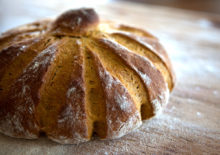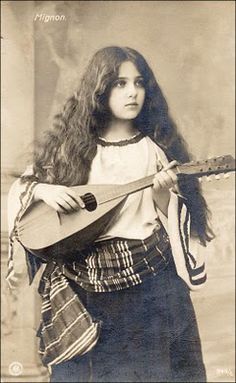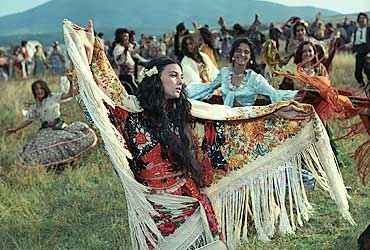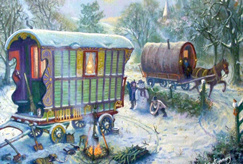Monthly Archives: October 2016
Gypsy Pumpkin Bread
- 2 lbs peeled pumpkin, cut into chunks
- 4 1/2 cups of strong white bread flour
- 1 tablespoon salt
- 1 oz fresh yeast
Instructions:
Bring a large pan of salted water to the boil and add the pumpkin. Simmer gently for about 20 minutes or until the pumpkin is tender. Drain well, reserve the liquid. Sieve the pumpkin into a bowl and beat to a puree. Cool until just warm, and then mix with the flour and salt. Dissolve the yeast in 6 tablespoons of the cooking liquid and leave in a warm place for about 10 minutes until frothy. Pour into the flour mixture and mix well to form a firm dough . If the mixture is too dry add a little more cooking liquid.
Knead well until smooth, place the dough in an oiled bowl, cover with a damp tea towel and leave in a warm place until doubled in size, about 2 hours. Knock back the dough, knead lightly, and shape into ball. Cover with lightly oiled plastic wrap and leave for about 1 hour until well risen.
Preheat the oven to 425 F. Using a sharp knife make a circular incision around the top of the ball about 2 inches from the edge. Place on a baking tray and cook for 45-50 minutes until deep golden and cooked through.
Found at: Journey Folki
Griddle Cakes – Gypsy Style
Ingredients:
- 2 cups self-raising flour
- Pinch of salt
- Pinch of ground mixed/pumpkin spices
- 4 tablespoons butter
- 4 tablespoons shortening or lard
- 3 tablespoons unrefined light brown muscovado sugar
- 4 tablespoons currants
- 1 tablespoon grated lemon peel
- 1 egg
- 1/2 cup milk
- Sugar for sprinkling
Instructions:
Sift the flour, salt, and spices into a mixing bowl and rub in the butter and shortening until the mixture resembles bread crumbs. Add the sugar, currants, and lemon peel. Beat the egg and milk together and add to the dry ingredients to form a soft dough. Roll out lightly on a floured surface about 1/4 inch thick and cut into 2 inch rounds. Cook on a hot floured griddle or heavy frying pan until golden on both sides. Sprinkle with sugar and serve hot and fresh.
From: Journey Folki
Vampire Pumpkins
Eat pumpkins quickly, lest they turn into vampires. People aren’t the only beings who can become vampiric. According to Balkan Romani folk traditions, hard-shelled, seedy fruits and vegetables can become vampires too. Although melons and squashes can also be vampiric, pumpkins – maybe because of halloween associations – have garnered the most attention.
The potential vampire is activated when a pumpkin is kept longer than ten days or not consumed before Christmas. Leaving it out all night exposed to a full moon may activate transformation, too. Not every pumpkin is guaranteed to turn into a vampire just as not every corpse is expected to rise. Vampire pumpkins betray themselves by making growling noises or developing red, vaguely blood-like splotches on their shells.
In general, there’s no need to worry about vampire pumpkins very much. As they don’t possess teeth, they can’t cause sudden, immediate harm. They are, however, unhealthy to keep around as they gradually absorb psychic energy from those around them. If a person is debilitated with low energy and a weak aura, such pumpkins can eventually cause damage, although it is a slow process. Vampire pumpkins also attract malevolent spirits.
Plunge vampiric pumpkins (or other suspect produce) into boiling water to kill them. Then break them into pieces and discard. (The traditional weapon for breaking them is a branch or handmade broom, which is then also discarded.)
Origin of the Name ‘Gypsy’
When the Roma arrived in Europe from the East, given their dark skin and eyes, they were believed to be from Turkey or Egypt. The word gypsy is derived from the word Egypt (gyp) and the people just called them gypsies. At that time the word did not have a negative connotation, but only identified the group as a people.
Also called travelers in many countries, they were nomadic people who rarely set down roots, traveling in wagons from place to place—always on the move—and sleeping in tents until the mid-1900s.
Gembétsa
Get kidney suet from the butcher and grind or chop it very fine after removing all skin and blood. Knead this with wheat flour, salt, pepper, baking soda, and parsley and enough water to make a stiff dry dough. In another pan fry bacon or sausage meat until quite crispy and break into small pieces. Shape the dough (about the size of a golf ball) around the fried bacon or sausage, sealing the ball. Drop into the soup you will serve with it and let cook. They will swell up about three times bigger.
From: Journey Folki
A Gypsy Love Song
Tropical night, Malaria moon
Dying stars of the silver screen
She danced that famous Gypsy dance
With a hole in her tambourine
I was young enough and dumb enough
I swallowed down my Mickey Finn
She’d hijacked a few hearts all right
I went into a tailspin
Don’t sing me, don’t sing me, don’t sing me
No more gypsy love songs
Don’t sing me, don’t sing me, don’t sing me
No more gypsy love songs
Don’t stir it up again
I put my arm around her waist
Says she, young man, you’re getting warm
The room was going somewhere without me
And she laughed as she read my palm
Stillborn love, passionate dreams, pitiful greed
And the silver tongues of the tinker girls,
Who throw their book of life at you
But don’t know how to read
Don’t sing me, don’t sing me, don’t sing me
No more gypsy love songs
Don’t sing me, don’t sing me, don’t sing me
No more gypsy love songs
Don’t stir it up again
She was third generation Transylvanian
I was the seventh son of a seventh son
I begged the band don’t play that tune
Please don’t beguine the begun
When I awoke, she’d cut and run
She stole my blueprints and my change
Just a horseshoe and a note on the bed
And all it said was–strange
Don’t sing me, don’t sing me, don’t sing me
No more gypsy love songs
Don’t sing me, don’t sing me, don’t sing me
No more gypsy love songs
Don’t stir it up again
~I found this little song in one of my files,
the music wasn’t with it and I don’t know the author.
Ederlezi
Ederlezi is a popular traditional folk song of the Romani minority in the Balkans (former Yugoslavia). Goran Bregovic’s version was used for the movie, Time of the Gypsies, actually made the song famous.
The song got its name after Ederlezi (otherwise known as Đurđevdan (Ђурђевдан) in Serbian, sometimes transcribed as Djurdjevdan).
Ederlezi is the Gypsy name for the Bulgarian and Serbian Feast of Saint George. It’s celebrated on the 6th May, a holiday signaling the beginning of spring, occurring approximately 40 days after the spring equinox. This Spring festival is especially celebrated by Roma people around the former Yugoslavia (and elsewhere around the world), regardless of religious affiliation.
I love this version, it’s sung by Preslava Peicheva – finalist in Music Idol Bulgaria.
Lyrics in Romani:
Sa me amala oro khelena
Oro khelena, dive kerena
Sa o Roma daje
Sa o Roma babo babo
Sa o Roma o daje
Sa o Roma babo babo
Ederlezi, Ederlezi
Sa o Roma daje
Sa o Roma babo, e bakren chinen
A me, chorro, dural beshava
Romano dive, amaro dive
Amaro dive, Ederlezi
E devado babo, amenge bakro
Sa o Roma babo, e bakren chinen
Sa o Roma babo babo
Sa o Roma o daje
Sa o Roma babo babo
Ederlezi, Ederlezi
Sa o Roma daje
English Translation:
All my friends are dancing the oro
Dancing the oro, celebrating the day
All the Roma, mommy
All the Roma, dad, dad
All the Roma, oh mommy
All the Roma, dad, dad
Ederlezi, Ederlezi
All the Roma, mommy
All the Roma, dad, slaughter lambs
But me, poor, I am sitting apart
A Romany day, our day
Our day, Ederlezi
They give, Dad, a lamb for us
All the Roma, dad, slaughter lambs
All the Roma, dad, dad
All the Roma, oh mommy
All the Roma, dad, dad
Ederlezi, Ederlezi
All the Roma, mommy
The former Yugoslav rock band Bijelo Dugme released a cover version of this song in Serbo-Croatian using the same melody, but with very different lyrics. Under the title “Đurđevdan je a ja nisam s onom koju volim” which is featured on their album Ćiribiribela from 1988.
Bijelo Dugme’s Lyrics:
Proljeće na moje rame slijeće
Đurđevak zeleni
Đurđevak zeleni
Svima osim meni
Drugovi odoše a ja osta
Nema zvijezde danice
Nema zvijezde danice
Moje saputnice
Ej kome sada moja draga
Na đurđevak miriše
Na đurđevak miriše
Meni nikad više
Evo zore evo zore
Bogu da se pomolim
Evo zore evo zore
Ej đurđevdan je
A ja nisam s onom koju volim
Njeno ime neka se spominje
Svakog drugog dana
Svakog drugog dana
Osim đurđevdana
English Translation:
Spring is landing on my shoulder
Lily of the valley is sprouting
Lily of the valley is sprouting
For everyone, except for me
The friends are gone, but I’ve stayed
There is no Morning Star
There is no Morning Star
My fellow-traveler
Hey, to whom does my darling now
Smells of the lily of the valley
Smells of the lily of the valley
To me never again
Here comes the sunrise,
here comes the sunrise
So I can pray to God
Here comes the sunrise,
here comes the sunrise
Hey it’s St George’s day
And I am not with the one I love
Let her name be mentioned
On every other day
On every other day
Except on St George’s day.
And here is a version with Greek lyrics, titled “Tou Ai Giorgi” (“Saint George’s”, Greek: “Του Αη Γιώργη”), was also recorded by Bregović together with Greek singer Alkistis Protopsalti in 1991. The Greek lyrics are credited to Lina Nikolakopoulou.
Lyrics in Greek:
Απ’ τους ώμους να, η Άνοιξη περνά,
γύρω φτερουγίζει,
ξεχνάει εμένα.
Μέρα της χαράς ποια ζωή φοράς;
Δρόμο δρόμο παίρνεις
χωρίς εμένα.
Του ουρανού πουλιά πάρτε με αγκαλιά
το βουνό γεμίζει κεριά αναμμένα
Nα κι η Πούλια ξημερώνει το Θεό παρακαλώ
μα το φως που δυναμώνει
δε μου φέρνει
δε μου φέρνει
‘κείνον που αγαπώ.
Το όνομα του ανθός, ευωδιάς βυθός,
πείτε στα κορίτσια να μην το λένε
μέρα σαν κι αυτή στ’ Άη Γιωργιού τ’ αφτί,
που όλα τα τραγούδια για αγάπη κλαίνε.
English Translation:
Look over the shoulders, spring passes,
flutters all around,
it forgets me
Day of joy, which life do you carry?
Υou take the road
without me.
Birds of sky, take me in your embrace
the mountain fills with lit candles
There it is the morning star, it’s breaking, I beg God
but the light which becomes stronger
it doesn’t bring me
it doesn’t bring me
the man that I love.
His name (is) flower, depth of perfume
tell to the girls not to say that
On the day like this one, at Saint George’s ear
where all the songs weep for love.
Source: Wikipedia
The Time of the Gypsies
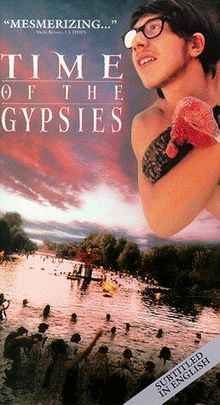 Time of the Gypsies
Time of the Gypsies (Serbian: Дом за вешање, Dom za vešanje, literally “Home for Hanging”) is a 1988 Yugoslav film by Serbian director Emir Kusturica. Filmed in Romani and Serbian, Time of the Gypsies
tells the story of a young Romani man with magical powers who is tricked into engaging in petty crime. It is widely considered to be one of Kusturica’s best films.
The film revolves around Perhan, a Gypsy teenager with telekinetic powers and his passage from boy to man that starts in a little village in Yugoslavia and that ends in the criminal underworld of Milan.
At the 1989 Cannes Film Festival, Emir Kusturica won the Best Director Award and the film was also nominated for a Palme d’Or (Golden Palm). At the 1991 Guldbagge awards in Sweden, the movie won the award for Best Foreign Film. In addition, Time of the Gypsies was nominated for Best Foreign Film at the 1990 César Awards in France.
Here’s the trailer for the movie:
Gypsy Fortune Telling
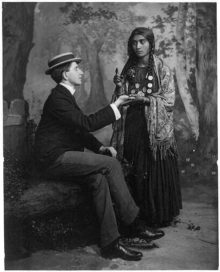 Gypsy women, as long as we have known anything of Gypsy history, have been arrant fortune-tellers. They plied fortune-telling about France and Germany as early as 1414, the year when the dusky bands were first observed in Europe, and they have never relinquished the practice. There are two words for fortune-telling in Gypsy, bocht and dukkering. Bocht is a Persian word, a modification of, or connected with, the Sanscrit bagya, which signifies ‘fate.’ Dukkering is the modification of a Wallaco-Sclavonian word signifying something spiritual or ghostly. In Eastern European Gypsy, the Holy Ghost is called Swentuno Ducos.
Gypsy women, as long as we have known anything of Gypsy history, have been arrant fortune-tellers. They plied fortune-telling about France and Germany as early as 1414, the year when the dusky bands were first observed in Europe, and they have never relinquished the practice. There are two words for fortune-telling in Gypsy, bocht and dukkering. Bocht is a Persian word, a modification of, or connected with, the Sanscrit bagya, which signifies ‘fate.’ Dukkering is the modification of a Wallaco-Sclavonian word signifying something spiritual or ghostly. In Eastern European Gypsy, the Holy Ghost is called Swentuno Ducos.
Gypsy fortune-telling is much the same everywhere, much the same in Russia as it is in Spain and in England. Everywhere there are three styles – the lofty, the familiar, and the homely; and every Gypsy woman is mistress of all three and uses each according to the rank of the person whose vast she dukkers, whose hand she reads, and adapts the luck she promises.
There is a ballad of some antiquity in the Spanish language about the Buena Ventura, a few stanzas of which translated will convey a tolerable idea of the first of these styles to the reader, who will probably with no great reluctance dispense with any illustrations of the other two:
Late rather one morning
In summer’s sweet tide,
Goes forth to the Prado
Jacinta the bride:
There meets her a Gypsy
So fluent of talk,
And jauntily dressed,
On the principal walk.
“O welcome, thrice welcome,
Of beauty thou flower!
Believe me, believe me,
Thou com’st in good hour.”
Surprised was Jacinta;
She fain would have fled;
But the Gypsy to cheer her
“O cheek like the rose-leaf!
O lady high-born!
Turn thine eyes on thy servant,
But ah, not in scorn.
“O pride of the Prado!
O joy of our clime!
Thou twice shalt be married,
And happily each time.
“Of two noble sons Thou shalt be the glad mother,
One a Lord Judge,
A Field-Marshal the other.”
Gypsy females have told fortunes to higher people than the young Countess Jacinta: Modor – of the Gypsy quire of Moscow – told the fortune of Ekatarina, Empress of all the Russias. The writer does not know what the Ziganka told that exalted personage, but it appears that she gave perfect satisfaction to the Empress, who not only presented her with a diamond ring – a Russian diamond ring is not generally of much value – but also her hand to kiss.
The writer’s old friend, Pepíta, the Gitana of Madrid, told the bahi of Christina, the Regentess of Spain, in which she assured her that she would marry the son of the King of France, and received from the fair Italian a golden ounce, the most magnificent of coins, a guerdon which she richly merited, for she nearly hit the mark, for though Christina did not marry the son of the King of France, her second daughter was married to a son of the King of France, the Duke of M-, one of the three claimants of the crown of Spain, and the best of the lot; and Britannia, the Caumli, told the good luck to the Regent George on Newmarket Heath, and received ‘foive guineas’ and a hearty smack from him who eventually became George the Fourth – no bad fellow by the by, either as regent or king, though as much abused as Pontius Pilate, whom he much resembled in one point, unwillingness to take life – the sonkaypè or gold-gift being, no doubt, more acceptable than the choomapé or kiss-gift to the Beltenebrosa, who, if a certain song be true, had no respect for gorgios, however much she liked their money:
Britannia is my nav;
I am a Kaulo Camlo;
The gorgios pen I be
A bori chovahaunie;
And tatchipen they pens,
The dinneleskie gorgies,
For mande chovahans
The luvvu from their putsies.
Britannia is my name;
I am a swarthy Lovel;
The Gorgios say I be
A witch of wondrous power;
And faith they speak the truth,
The silly, foolish fellows,
For often I bewitch
The money from their pockets.
Fortune-telling in all countries where the Gypsies are found is frequently the prelude to a kind of trick called in all Gypsy dialects by something more or less resembling the Sanscrit kuhana; for instance, it is called in Spain jojana, hokano, and in English hukni. It is practised in various ways, all very similar; the defrauding of some simple person of money or property being the object in view. Females are generally the victims of the trick, especially those of the middle class, who are more accessible to the poor woman than those of the upper. One of the ways, perhaps the most artful, will be found described in another chapter (What is The Hukni? and What is Cauring?)
From: Romano Lavo-Lil
Bringing Money Home
 Here is a spell for bringing money right through your front door:
Here is a spell for bringing money right through your front door:
When the moon is new, sprinkle a $1, $10, $20 or $50 bill with cinnamon and then secretly place it underneath the front doormat inside your home.
It will be charged with positive energy every time someone walks over it. The greater the value of the bill, the larger your returns could be. The money should only be removed when the moon is full; otherwise you will attract unexpected expense to your door.
From: The Good Spell Book
